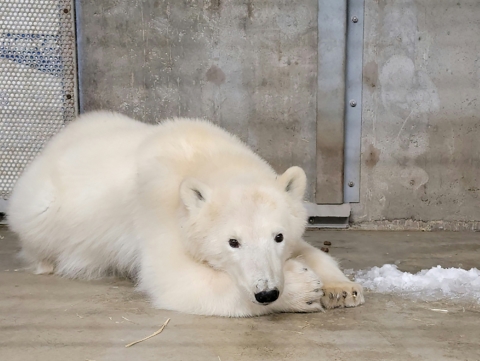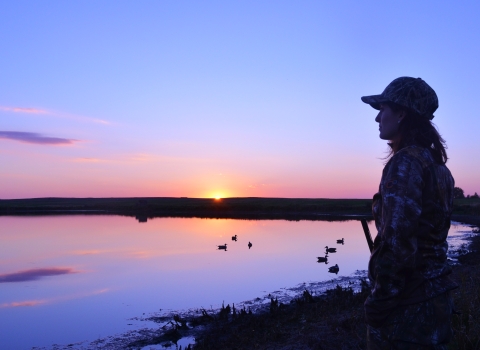On Nov. 24, 2022, the U.S. Fish and Wildlife Service was notified of a lone polar bear cub roaming the Prudhoe Bay area of Alaska. The Service sent a team of polar bear program biologists to the area to assess the situation. The team, in consultation with the Alaska Zoo veterinarian, made the difficult and rare decision that the approximately 10 to 11-month-old female bear should be removed from the wild population. This decision was made because the bear was exhibiting comfort around people, raising concerns for potential human-bear conflicts.
Once the bear was captured and determined to be stable through visual and physical inspection, it was transported to the Alaska Zoo in Anchorage, which has the facilities and experience to provide for the animal's immediate needs. The bear appears to be in fair to good condition, although it is a little underweight—weighing 103 pounds—with some small lacerations on its upper lip.
At this time, the cub will not be on public display at the Alaska Zoo. Public opportunities to view the cub would be provided only with the Service’s approval and if zoo staff deems the bear to be completely healthy and the opportunity appropriate to the cub's development.
“The decision to remove this bear from the wild was not made lightly,” said Service Polar Bear Program Lead David Gustine. “Removing a bear is not a good outcome for the individual or the wild population, but we felt it was the best course of action in this situation.”
“Our primary concern is for the wellbeing of the cub,” said Alaska Zoo Executive Director Patrick Lampi. “It had been observed eating a fox, lacerations on its upper lip are likely from that activity. With rabies in fox prevalent in the Prudhoe Bay area, we have special extended quarantine procedures in place for this cub.”
A future determination on the long-term care of this animal will be made by the Service after considering all options. Given the bear’s behavior around humans and its young age, it will not be returned to the wild. Polar bear cubs in the wild stay with their mothers for up to 2.5 years.
It is rare that the Service decides to remove a polar bear from the wild population. The last time this happened was in 2013, when a male cub—Kali—was orphaned in Point Lay. Kali was initially cared for at the Alaska Zoo. He was permanently placed at the Saint Louis Zoo.
The Service has been responsible for the management of polar bear populations in the United States since 1972 under the Marine Mammal Protection Act and under the Endangered Species Act since 2008, when it was listed as a threatened species due to the loss of its sea-ice habitat.
The Service recognizes and appreciates the partners who have played a key role in recovering, transporting and caring for this young bear, including Hilcorp who reported the animal and assisted in assessing the situation, Alaska Clean Seas who provided logistical and field support, and the Alaska Zoo who is housing and caring for the bear cub.
Learn more about the U.S. Fish and Wildlife Service Polar Bear Program.




